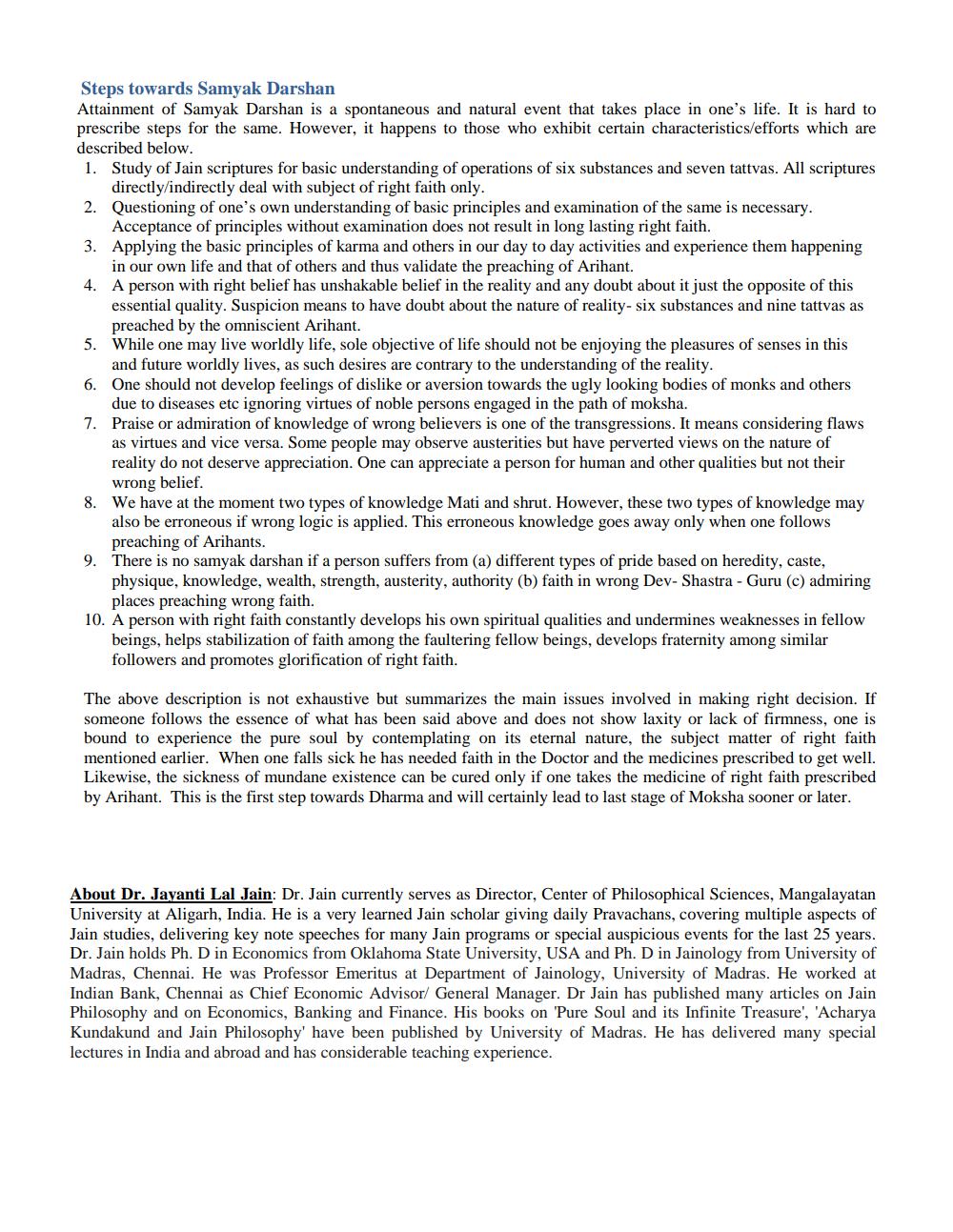________________ Steps towards Samyak Darshan Attainment of Samyak Darshan is a spontaneous and natural event that takes place in one's life. It is hard to prescribe steps for the same. However, it happens to those who exhibit certain characteristics/efforts which are described below. 1. Study of Jain scriptures for basic understanding of operations of six substances and seven tattvas. All scriptures directly/indirectly deal with subject of right faith only. 2. Questioning of one's own understanding of basic principles and examination of the same is necessary. Acceptance of principles without examination does not result in long lasting right faith. 3. Applying the basic principles of karma and others in our day to day activities and experience them happening in our own life and that of others and thus validate the preaching of Arihant. 4. A person with right belief has unshakable belief in the reality and any doubt about it just the opposite of this essential quality. Suspicion means to have doubt about the nature of reality-six substances and nine tattvas as preached by the omniscient Arihant. While one may live worldly life, sole objective of life should not be enjoying the pleasures of senses in this and future worldly lives, as such desires are contrary to the understanding of the reality. 6. One should not develop feelings of dislike or aversion towards the ugly looking bodies of monks and others due to diseases etc ignoring virtues of noble persons engaged in the path of moksha. 7. Praise or admiration of knowledge of wrong believers is one of the transgressions. It means considering flaws as virtues and vice versa. Some people may observe austerities but have perverted views on the nature of reality do not deserve appreciation. One can appreciate a person for human and other qualities but not their wrong belief. 8. We have at the moment two types of knowledge Mati and shrut. However, these two types of knowledge may also be erroneous if wrong logic is applied. This erroneous knowledge goes away only when one follows preaching of Arihants. 9. There is no samyak darshan if a person suffers from (a) different types of pride based on heredity, caste, physique, knowledge, wealth, strength, austerity, authority (b) faith in wrong Dev- Shastra - Guru (c) admiring places preaching wrong faith. 10. A person with right faith constantly develops his own spiritual qualities and undermines weaknesses in fellow beings, helps stabilization of faith among the faultering fellow beings, develops fraternity among similar followers and promotes glorification of right faith. The above description is not exhaustive but summarizes the main issues involved in making right decision. If someone follows the essence of what has been said above and does not show laxity or lack of firmness, one is bound to experience the pure soul by contemplating on its eternal nature, the subject matter of right faith mentioned earlier. When one falls sick he has needed faith in the Doctor and the medicines prescribed to get well. Likewise, the sickness of mundane existence can be cured only if one takes the medicine of right faith prescribed by Arihant. This is the first step towards Dharma and will certainly lead to last stage of Moksha sooner or later. About Dr. Jayanti Lal Jain: Dr. Jain currently serves as Director, Center of Philosophical Sciences, Mangalayatan University at Aligarh, India. He is a very learned Jain scholar giving daily Pravachans, covering multiple aspects of Jain studies, delivering key note speeches for many Jain programs or special auspicious events for the last 25 years. Dr. Jain holds Ph. D in Economics from Oklahoma State University, USA and Ph.D in Jainology from University of Madras, Chennai. He was Professor Emeritus at Department of Jainology, University of Madras. He worked at Indian Bank, Chennai as Chief Economic Advisor/ General Manager. Dr Jain has published many articles on Jain Philosophy and on Economics, Banking and Finance. His books on 'Pure Soul and its Infinite Treasure', 'Acharya Kundakund and Jain Philosophy' have been published by University of Madras. He has delivered many special lectures in India and abroad and has considerable teaching experience.




